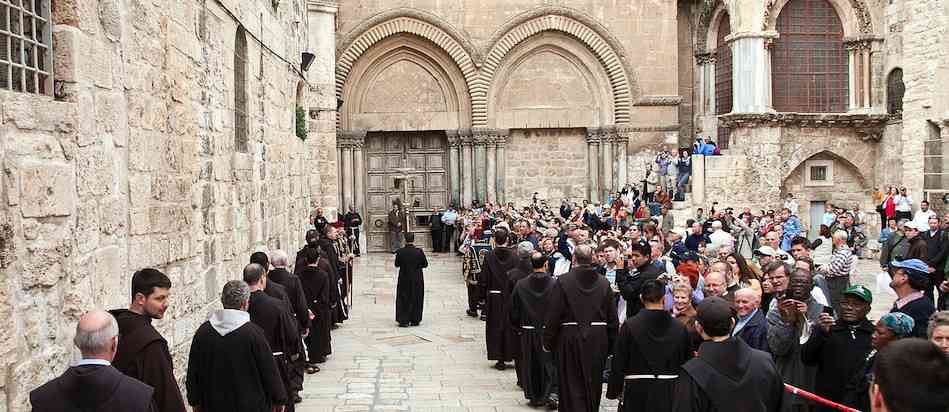The saint’s indication to “immerse oneself without discussion or dispute” in mission. The protection of sacred places, help to local communities and the needy. The Franciscans remained in Syria to be near to the suffering people despite the dangers. The dialogue between Christians and the “majority religions” of the Holy Land.
JERUSALEM: 800 years have passed since the order of the Friars Minor settled in the Holy Land. A constant presence in the service of holy places, the Christian community and the needy. For the Custodian, Fr. Francesco Patton, a continues story since 1217, lived in the sign of dialogue, the sprouting seed of St. Francis’s intuition to “immerse oneself in mission without discussion or dispute”.
The Order of the Friars Minor, founded in 1209, opened itself to missionary evangelization already in 1217. With the General Chapter of that year, the order was divided into Provinces, including that of “Overseas”, later renamed ” Holy Land”. St. Francis visited it between 1219 and 1220 when he met Sultan Malik al-Kamil in the delicate context of the Crusades, asking permission for himself, his confreres and pilgrims to visit the Holy Land.
Interviewed by AsiaNews, the custodian spoke of the celebrations held on October 16 to 18 in Jerusalem, attended by Card. Leonardo Sandri, prefect for the Congregation of the Oriental Churches, and Michael Perry, General Minister of the Order of the Friars Minor. Pope Francis even marked the occasion with a message in which he encourages the Franciscans “to persevere in supporting our brothers, especially the poor and the weak, in the education of youth, in the reception of the elderly and in the care of the infirm, realizing the works of mercy in everyday life”.
Fr. Patton believes that the duty of Franciscans is to be “a fraternal presence in the sign of Pentecost, an international fraternity.” A necessary global definition, because it helps “to overcome the temptation to close ourselves within cultural and ethnic identities”.
The Custody’s commitment is to protect sacred places, about 70 sanctuaries, and support the local Christian community through the parishes of the Holy Land. And then social works, close to people in distress. Card. Sandri, like the pope, wanted to thank the Franciscans for staying in Syria at the cost of their own lives. At a convention on October 17, the Prefect remembered those who “experienced a genuine martyrdom of the blood,” such as the priests Francois Mourad and Frans Van der Lugt, and those who “bear witness with daily dedication.”
Another fundamental activity of the Custody is that of schools, not only “because they are places for youth education but also for coexistence between Christians and Muslims”.
“At the origin of the [Franciscan] presence is a seed that has developed over the centuries, from which great fruit is born. We have sprouted from an intuition of Saint Francis: to serve ‘avoiding disputes and discussions’. The Franciscan presence in the Holy Land has developed as a presence of love for this land, because it is the places of the Incarnation that reminds us that Christianity is not based on a myth but on a historical event. A love also for those who have lived, still live and will live in this land.”
“In the years to come, we will remain in service to the sanctuaries, local communities, suffering people,” continues Fr. Patton. “The fruits continue to be these, although the contexts and people who need to be welcomed and sustained change.”
For the Custody, dialogue and collaboration with other Christian confessions is indispensable. There are “very good relations” particularly since the restoration of the Holy Sepulcher aediculein Jerusalem. Thanks to the Assembly of Christian Leaders, “in difficult situations, we try to have unified positions and support each other. It’s a good way forward. Representatives from other communities were also present at the celebrations.”
Dialogue with the “majority” Islamic and Jewish religions is equally important. They are far superior in number to Christians, who are less than 2% of the Holy Land population. “Dialogue continues through dedicated bodies and in everyday life, on the occasions that presenting themselves. This year we had the opportunity to reflect with Muslims and Jews on the ecological theme, and we also found a sense of harmony in creation. And then the possibilities that arise in everyday life: the students of the [Franciscan] schools are mostly Muslim, these young people have been doing all the schoolwork with us for 12 years, and thus facilitating dialogue since childhood. ”
“We will continue this celebration not as a triumphalistic celebration, but as a way to revive the reasons and stimulus to be present today in this land with commitment and dedication. In two years, it will be 800 years since St. Francis arrival in the Holy Land and his meeting with the Sultan, an icon of interreligious dialogue in mutual respect. These celebrations will continue to be a stimulus to serve everyone for God’s love, and to nourish the paths of dialogue, because there can never be too much dialogue,” concludes Fr. Patton.–Asia News


